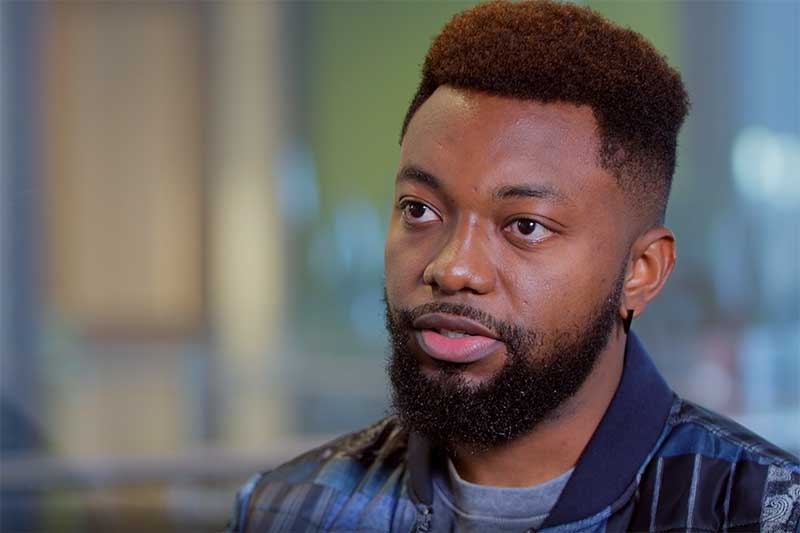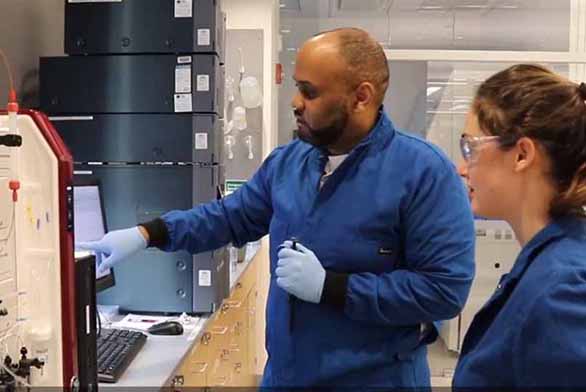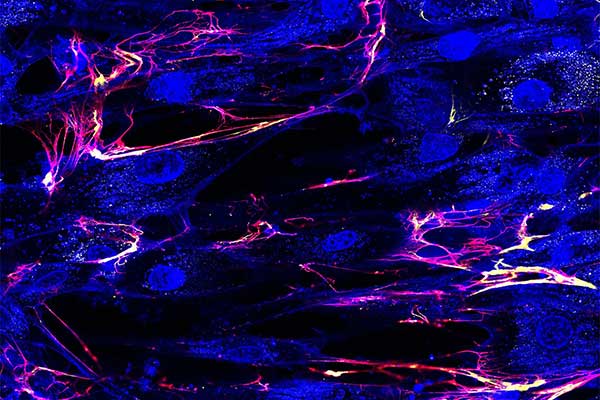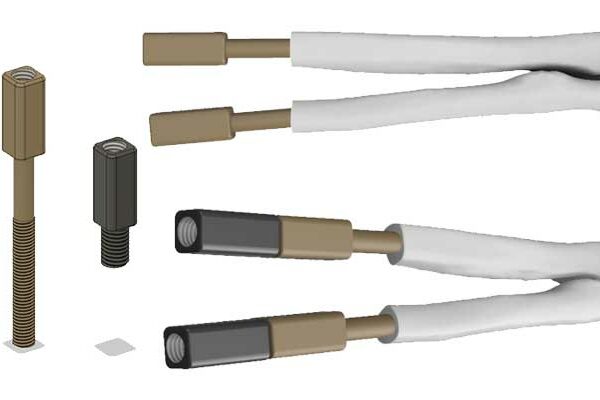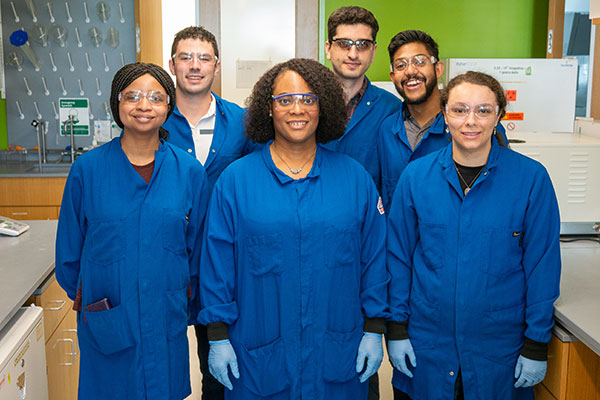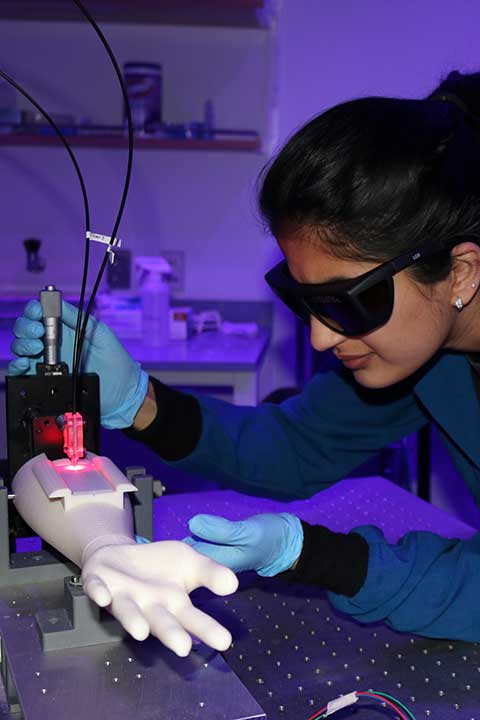
Master of Science in Bioengineering
Master of Science in Bioengineering
Overview
Northeastern’s Master of Science (MS) in Bioengineering equips students with the interdisciplinary education and real-world skills to meet the growing demand for professional engineers to lead in physiological processes in health and disease and improve methods for medical devices and treatments. Our approach to focus on a specific concentration prepares graduates to excel with competitive expertise over graduate programs offering a general curriculum.
Concentrations: cell and tissue engineering; biomechanics; biomedical devices and bioimaging; and systems, synthetic, and computational bioengineering (see details below).
Flexibility: The Bioengineering MS degree offers part- and full-time enrollment options and a selection of asynchronous online classes. The MS in Bioengineering can be completed in 2 semesters (Fall and Spring) without a cooperative education experience, or up to two years with cooperative education included. Learn more about the 1-year master’s plan.
Eligibility: The bioengineering program is designed for students with different backgrounds, including students with a BS within the STEM fields; students who would like to strengthen their academic credentials or portfolio prior to applying to medical school; and professionals within biotech industry looking to strengthen their technical background, redirect their specific expertise, and broaden future employment opportunities.
Vibrant Location: Located directly adjacent to the world-renowned Longwood Medical Area in Boston with the world’s prestigious hospitals, and nearby Cambridge, a hub for pharmaceutical research, Northeastern provides an excellent opportunity for students to combine engineering, medicine, and biology through education, research, and professional experience with Northeastern’s top-ranked cooperative education program. A computational medicine focus is also offered at our Portland, Maine location.
Innovative Curriculum - MS in Bioengineering
The Department strives to create an atmosphere of innovation and creativity that fosters excellence in instruction and research and provides a foundation for programs that drive forward the cutting edge of knowledge while establishing translational collaborations with clinical and industrial researchers.
Although this program is designed specifically for students with BS degrees in engineering or physics, students with a degree in biological or chemical sciences may apply. However, admission of students with different academic backgrounds will be contingent on the successful completion of undergraduate prerequisites required for the core courses of the program. This may require the student to take up to a year of undergraduate courses to fulfill the necessary requirements for enrolling in the core courses of the Bioengineering master’s (MS) curriculum.
Bioengineering faculty have established highly interdisciplinary collaborations with faculty members from the College of Engineering, Pharmaceutical Sciences, Biology, Chemistry, Physical Therapy, and more.
Located directly adjacent to the world-renowned Longwood Medical Area in Boston with the world’s prestigious hospitals, and nearby Cambridge, a hub for pharmaceutical research, Northeastern provides an excellent opportunity for students to combine engineering, medicine, and biology through education, research, and professional experience as part of Northeastern’s top-ranked cooperative education program.
Students select from four concentrations, and a thesis option, project option, or course-only option.
Concentrations develop deep expertise in an area of particular interest and encourages individual research through a one-semester master’s project or two-semester master’s thesis in one of the following research areas.
- Molecular, Cell and Tissue Engineering
- Biomechanics, Biotransport and Mechanobiology
- Biomedical devices and bioimaging
- Systems, Synthetic, and Computational Bioengineering
The MS in Bioengineering offers part- and full-time enrollment options and a selection of asynchronous online classes. The MS in Bioengineering can be completed in 2 semesters (Fall and Spring) without a cooperative education experience, or up to two years with cooperative education included. Learn more about the 1-year master’s plan for our concentrations.
In addition to Boston, the Systems, Synthetic, and Computational Bioengineering concentration is offered at the Roux Institute at Northeastern in Portland, Maine focused on computational medicine.
Note: a subset of electives may be offered at the regional campus.
The MS in Bioengineering provides significant opportunities for student research, working with accomplished faculty. With a premier location in downtown Boston, as well as in Portland, Maine, research in the department leverages the wealth of collaborations with neighboring universities, hospitals, medical centers and industry.
Bioengineering research enjoys strong support from multiple government agencies. NIH has historically led all other agencies in budget increases, consuming today roughly 50% of all non-defense research spending. Healthcare spending expanded from 6% of the GDP in 1960 to 15% in 2000 and has climbed to 20% in 2020, in part due to the aging of the baby-boom generation. The COVID-19 pandemic was another chief driver of healthcare needs. Biomedical advances are increasingly dependent on quantitative approaches as exemplified by bioengineering, and the general perception is that government support for this research will continue to rise (or, at the very least, erode more slowly than other areas). The energy crisis and global climate change threats have also fostered interdisciplinary research across bioengineering with other fields such as biofuel cells, bio-batteries, bioremediation, bio-carbon sequestration, etc., and many agencies such as EPA, DOE, DOD and DARPA support these research directions.
- An ability to identify, formulate, and solve complex engineering problems.
- An ability to explain and apply engineering design principles, as appropriate to the program’s educational objectives.
- An ability to produce solutions that meet specified end-user needs with consideration of public health, safety, and welfare, as well as global, cultural, social, environmental, and economic factors.
- To develop and demonstrate rigorous knowledge in relevant areas of Bioengineering including i) Biomedical Devices and Bioimaging, ii) Cell and Tissue Engineering, and, iii) Biomechanics.
- To develop and demonstrate and ability to perform critical analysis of scientific journal articles.
- To prepare students for careers in Bioengineering
Over 15 graduate certificates are available to provide students the opportunity to develop a specialization in an area of their choice. Certificates can be taken in addition to or in combination with a master’s degree, or provide a pathway to a master’s degree in Northeastern’s College of Engineering. Master’s programs can also be combined with a Gordon Engineering Leadership certificate. Students should consult with their faculty advisor regarding these options.
Gordon Institute of Engineering Leadership
Students may complete a Master of Science in Bioengineering in addition to earning a Graduate Certificate in Engineering Leadership. Students must apply and be admitted to the Gordon Engineering Leadership Program in order to pursue this option. The program requires fulfillment of the 16-semester-hour-curriculum required to earn the Graduate Certificate in Engineering Leadership, which includes an industry-based challenge project with multiple mentors. The integrated 33-semester-hour degree and certificate will require 17 hours of advisor-approved bioengineering technical courses.
Engineering Business Certificate
Students may complete a Master of Science in Biongineering with a concentration in biomedical device and bioimaging in addition to earning a Graduate Certificate in Engineering Business. Students must apply and be admitted to the Galante Engineering Business Program in order to pursue this option. The program requires the applicant to have earned or be in a program to earn a Bachelor of Science in Engineering from Northeastern University. The integrated 32-semester-hour degree and certificate will require 16 semester hours of the bioengineering core courses and 16 semester hours from the outlined business-skill curriculum. The coursework, along with participation in co-curricular professional development elements, earn the Graduate Certificate in Engineering Business.
Concentrations
Students accepted to the Master of Science in Bioengineering program can choose from the following concentrations.
The cell and tissue engineering concentration is appropriate for students interested in molecular, cell, and tissue engineering. Two courses Molecular Bioengineering (BIOE 5410) and Cellular Engineering (BIOE 5420) are required of all cell and tissue engineering students. There is an extensive list of approved technical electives to choose from to complete the degree.
View description of the Molecular, Cell and Tissue Engineering Concentration.
Systems bioengineering focuses on using engineering principles to model and understand complex biological systems, using advanced large-scale experimental technologies and specialized mathematical and computational tools. It involves procuring, manipulating, and analyzing very large data sets to study and understand biological systems. In addition, the acquired understanding of the design principles of biological systems allows design and implementation of synthetic biological systems with required functions for clinical, agricultural, environmental, and energy applications. Topics covered include statistical physics, statistical inference, dynamical and stochastic modeling, execution and analysis of quantitative experimentation, machine learning, and control and information theory. These techniques are taught in the context of biological applications.
View description of the Systems, Synthetic, and Computational Bioengineering Concentration. A computational medicine focus of this concentration is offered at Northeastern’s Roux Institute in Portland, Maine. Learn about the computational medicine offering.
Students who join the biomechanics concentration will cover multiscale mechanics, including whole-body movement, mechanical properties of biomaterials, and fluid mechanics of physiological fluids. The two courses required of all biomechanics concentration students are Multiscale Biomechanics (BIOE 5650) and Musculoskeletal Biomechanics (ME 5665).
The biomedical devices and bioimaging concentration is appropriate for students interested in the design of biomedical devices, as well as biomedical imaging and signal processing. Three courses are required for all students in this concentration, Design of Biomedical Instrumentation (BIOE 5810), Design, Manufacture, and Evaluation of Medical Devices (BIOE 5250), and Biomedical Imaging (BIOE 5235).
Experiential Learning
Northeastern combines rigorous academics with experiential learning and research to prepare students for real-world engineering challenges. The Cooperative Education Program, also known as a “co-op,” is one of the largest and most innovative in the world, and Northeastern is one of only a few that offers a Co-op Program for graduate students. Through this program, students gain up to eight months of professional experience employed in their field of interest as part of the academic curriculum, giving them a competitive advantage after graduation. Northeastern has over 3,000 co-op employer partners, from large companies to entrepreneurial start-ups, and dedicated co-op coordinators to guide students through the process.
Program Goals
Bioengineering is a growing sector of the engineering profession. The aging of the U.S. population and the nationwide focus on health issues will help drive demand for better medical devices and equipment designed by biomedical engineers. Additionally, an increased concern for cost-effectiveness will boost demand for biomedical engineers, particularly in pharmaceutical and device manufacturing and related industries.
Employment of bioengineers and biomedical engineers is projected to grow 10 percent from 2021 to 2031, faster than the average for all occupations. The median annual wage for bioengineers and biomedical engineers was $97,410 in 2021, according to the U.S. Bureau of Labor Statistics.
Academic Advising
The Academic Advisors in the Graduate Student Services office can help answer many of your questions and assist with various concerns regarding your program and student record. Use the link below to also determine which questions can be answered by your Faculty Program Advisors and OGS Advisors.
Admissions & Aid
Ready to take the next step? Review degree requirements to see courses needed to complete this degree. Then, explore ways to fund your education. Finally, review admissions information to see our deadlines and gather the materials you need to Apply.
